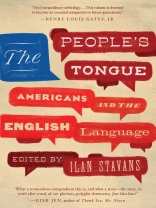A riveting, one-of-a-kind anthology of the diversity, strangeness, and power of American English that features a tremendous array of letters, poems, memoir, jeremiads, stories, songs, documents, and more from Sojourner Truth and Abraham Lincoln to Henry Roth and Zora Neale Hurston, from George Carlin and James Baldwin to Richard Rodríguez and Amy Tan, from Tony Kushner and Toni Morrison to Louise Erdrich and Donald Trump.
This volume is a kind of people’s history of English in the United States, told by those who have transformed it: activists, teachers, immigrants, journalists, nurses, poets, astronauts, dictionary makers, actors, musicians, playwrights, preachers, Supreme Court Justices, rappers, translators, singers, children’s book authors, scientists, politicians, foreigners, students, homemakers, lexicographers, scholars, newspaper columnists, TV personalities, senators, novelists, technology innovators, and a bunch of fanatics.
The quest is to understand how an imperial language like English, with Germanic origins, whose spread resulted from the Norman conquest, came to be an intrinsic component of the first and most influential democratic experiment in the world. Edited by internationally renowned cultural commentator and consultant for the OED Ilan Stavans, it is organized chronologically and offers a banquet of letters, poems, autobiographical reflections, op-eds, dictionary entries, stories, songs, legislative documents, and other evidence of verbal mutation. It addresses Ebonics, and Yinglish, Spanglish, and other linguistic concoctions, including sci-fi inventions.
In pages in which the story is not only the what but the how, The People’s Tongue starts with samples of the English used by the settlers in Plymouth Colony and it ends with President Donald Trump’s tweets.
Mục lục
Introduction: Language as Character, by Ilan Stavans
Chronology
Part I: Landing Mode
Anne Winthrop: “Letter to Adam Winthrop” (1581)
Robert Smith: from New England Primer (1687)
John Adams: “Proposal for an American Language Academy” (1780)
Thomas Jefferson: “Letter to John Waldo Monticello” (1813)
Noah Webster: preface to An American Dictionary of the English Language (1828)
Alexis de Tocqueville: from Democracy in America (1835)
Lydia Huntley Sigourney: “Indian Names” (1841)
Thomas Hopkins Gallaudet: from “On the Natural Languages of Signs II” (1848)
Sojourner Truth: “Ain’t I a Woman?” (1851)
Abraham Lincoln: “Gettysburg Address” (1863)
Bret Harte: “The Spelling Bee at Angels” (1878)
Mark Twain: from Adventures of Huckleberry Finn (1884)
José da Fonseca and Pedro Carolino: from English as She Is Spoke (1884)
Walt Whitman: “Slang in America” (1885)
Emily Dickinson: Poem #236 (1886)
Richard Henry Pratt: from “Kill the Indian, Save the Man” (1892)
Simon Pokagon: “On Naming the Indians” (1897)
Paul Laurence Dunbar: “When Malindy Sings” (1903)
Ambrose Bierce: “Two Definitions” (1906)
Henry James: from The American Scene (1907)
Mary Antin: from The Promised Land (1912)
William L. Harding: “Babel Proclamation” (1918)
Theodore Roosevelt Jr.: “The Last Message” (1919)
Part II: Fly Me to the Moon
H. L. Mencken: “The Characters of American” (1919)
e e cummings: “next to of course god america i” (1926)
Thomas Wolfe: “Only the Dead Know Brooklyn” (1935)
Henry Roth: from Call It Sleep (1936)
Zora Neale Hurston: from Their Eyes Were Watching God (1937)
Abel Meeropol and Billie Holiday: “Strange Fruit” (1939)
Abbott and Costello: “Who’s on First?” (1944)
Martin Minoru Iida: “Go for Broke” (1944)
Lucille Ball and Desi Arnaz: “Ough” (1953)
William Faulkner: from “What’s the Good Word” (1958)
Dr. Seuss: from Green Eggs and Ham (1960)
Amiri Baraka: “Expressive Language” (1963)
Bob Dylan: “A Hard Rain’s A-Gonna Fall” (1963)
Dwight Mc Donald: from “The String Untuned” (1963)
Leo Rosten: from The Joys of Yiddish (1968)
George Carlin: “The Seven Words You Can Never Say on Television” (1972)
Adrienne Rich “Transcendental Etude” (1978)
James Baldwin: “If Black English Isn’t a Language, Tell Me What Is? (1979)
Isaac Bashevis Singer: “On Translating My Books” (1979)
Sugarhill Gang: from “Rapper’s Delight” (1979)
E. B. White: Introduction to Oliver Strunk’s The Elements of Style (1979)
John Ashbery: “Paradoxes and Oxymorons” (1980)
Russell Hoban: from Riddley Walker (1980)
Samuel Ichiye Hayakawa: “Speech on Language Amendment” (1982)
Richard Rodríguez: “English, Sí” (1982)
Part III: The Ruckus of Polyphony
Gloria Anzaldúa: from “How to Tame a Wild Tongue” (1987)
Judith Ortiz Cofer: “Homework: Define Caliente” (1987)
Julia Álvarez: “Bilingual Sestina” (1990)
Amy Tan: “Mother Tongue” (1990)
Tony Kushner: from Angels in America (1991)
Toni Morrison: “Nobel Lecture” (1993)
Chang-Rae Lee: “Mute in an English-Only World” (1996)
Jamaica Kincaid: “In History” (1997)
Robert F. Panara: “On His Deafness” (1997)
Bill Clinton: “Memorandum on Plain Language in Government Writing” (1998)
Louise Erdrich: “Two Languages in Mind, but Just One in the Heart” (2000)
Joy Harjo: “A Map to the Next World” (2000)
David Foster Wallace: “Tense Present: Democracy, English, and the Wars Over Usage” (2001)
Susan Sontag: “The World as India” (2002)
Ha Jin: from The Writer as Migrant (2008)
Ammon Shea: “The Keypad Solution” (2010)
Yusef Komunyakaa: “English” (2011)
Peter Sokolowski: “New Words and the Dictionary” (2012)
Jesse Sheidlower: “The Case for Profanity in Print” (2014)
Ilan Stavans: “In Defense of Spanglish” (2014)
Kendrick Lamar: “DNA” (2017)
Natalie Diaz “Manhattan is a Lenape Word” (2020)
Donald Trump: “CNN” (2021)
Jhumpa Lahiri: “Lingua / Language” (2022)
John Mc Worther: “English as a Living Language—Period” (2022)
Permissions
Index
Giới thiệu về tác giả
Ilan Stavans was born in Mexico City and is the publisher of Restless Books and a passionate lover of dictionaries, with a collection of over three hundred now housed in his personal collection at the University of Pennsylvania. He has published an assortment of books about language, including Spanglish: The Making of a New American Language (2003), Dictionary Days: A Defining Passion (2005), Resurrecting Hebrew (2008), and How Yiddish Changed America and How America Changed Yiddish (2000).












